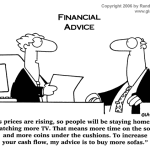A version of this post previously appeared in the San Antonio Express News.
Some friends of mine recently opened up investment accounts with a guy who is a salesman at a national insurance company. My friends also hired a “fiduciary” to review their investment plans. Finally, they consulted me, for free, on what to do with their investments because I’m a friend.
They seek answers to something nobody ever bothers to teach. They need financial advice. Who doesn’t?
Among the three sources they recently contacted, they will certainly hear quite a bit of possibly contradictory advice. In the long run, I got to thinking, do they also need to hire an investment advisor?
“Do you need an investment advisor?” is one of those evergreen questions for people who have managed to accumulate some investments.
The short, albeit possibly contradictory answer — given that I do not have an investment advisor myself — is: “Yes, probably.”
Following on the heels of that question, if the answer to the first question is yes, is: “What do I need an investment advisor for?”
I’m so glad you asked. And you’re not going to believe this, but I have very strong opinions on this question.
A good investment advisor should do two — and only two — things, and then stop.
Number one thing: Set up an investment plan for the client that has a reasonable chance for success at meeting the client’s goals, taking into account the client’s ability to save and invest. The plan should be so simple that all parts can be understood clearly by the client. The plan should run on auto-pilot (probably involving automatic paycheck or bank account deductions), and should rebalance on a low-frequency cycle (probably through new purchases, rather than sales).
All of this should be accomplished within two visits with the investment advisor.
Number two thing: When the market crashes — by the way, the only 100-percent guaranty in an investing life is that the market will crash, probably more than once, in a client’s 30-year investment cycle — the investment advisor is there to prevent the client from selling after the crash. Because when things get cheap you’re supposed to buy more, not sell.
Psychologically speaking, few of us can stomach the nausea of actually buying after the crash.
Ahem. Now, would all those reading this who made stock purchases in March 2009 please raise your hand?
Oh, really? All of you with your hands up are liars.
While we rarely have the sense to buy at the lowest point in the market, realistically a good investment advisor reminds us at least not to sell after the crash happens. The good advisor reminds us that we knew a crash would happen a couple of times in our 30-year investment cycle.
After the crash comes you don’t sell — you just keep on doing what you’re doing. If the advisor can prevent the panicked sale after the crash, the advisor is worth all the money paid to her over the years.
And that’s it. Anything else that an investment advisor does is probably too much, and the client may suffer as a result.
“But, but, but…..” I can already hear all of the investment advisors out there protesting.
But what about tax planning? And estate planning?
What about insurance products? Have you considered whole life versus term life insurance. Or can I interest you in a variable annuity?
But shouldn’t an advisor pre-screen some hedge funds and venture capital funds?
Want to hear about oil & gas leases? Master limited partnerships?
I’m pretty sure there’s real estate and mortgage refinancing to be done, no?
What about picking great stocks for a client?

But what should I know about precious metals, agricultural commodity futures, and that new project finance deal in Ghana?
I also once read something about sector rotation? And then there’s value vs. growth? And biotech, and countercyclical consumer products!
What about anticipating the Fed, trading ahead of new data releases, getting in early on the next hot trend, or black-box trading and currency hedging?
Look, I agree — finance can be endlessly fun and interesting, and these are all great areas for a broker or investment advisor to get into because they produce wonderful opportunities for additional fees, commissions, portfolio churn and opacity. In most cases, however, they just don’t happen to produce wonderful results for clients.
If you need insurance or tax planning, by all means hire an expert. But a good investment advisor does not necessarily serve her client by brokering all these products.
To sum up:
Do you know how to set up what I describe above as “the number one thing” all on your own? If not, you probably need an investment advisor.
Second, do you know — beyond a shadow of a doubt — what you will do when the market crashes? Are you sure? If not, you probably need an investment advisor to hold your hand — that itchy-to-sell trigger-finger hand — to prevent you from selling.
Please see related posts: Book Review of Simple Wealth Inevitable Wealth by Nick Murray

Post read (3007) times.

